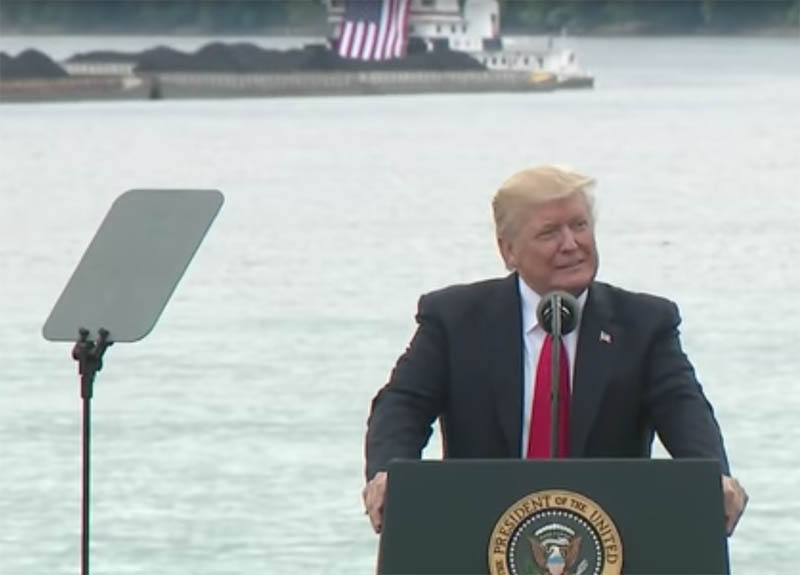Members of the inland waterways industry canvassed Capitol Hill this week with a strong message to Congress that they are unhappy with elements of President Trump’s infrastructure package and his fiscal 2019 budget plan for inland waterways funding.
Release of the president’s highly anticipated infrastructure plan and federal budget blueprint coincided with the annual Washington meeting of the Waterways Council, an industry-funded group that advocates for improvements to inland river infrastructure.
Industry members were stunned by the proposals. Their meeting agenda was dominated by discussion of what they feel are unjust plans to impose user fees on commercial users of the river, and a budget plan that would leave three ongoing lock and dam construction projects without continued funding. After the meetings concluded, industry representatives met with members of Congress and their staffs on Wednesday to discuss their concerns.
The president’s plan proposes to finance river infrastructure improvements by allowing the government, most likely the Army Corps of Engineers, and “third party service providers” to impose and retain tolls or lockage fees on the lock and dam system. The fees would be in addition to the 29-cent-per-gallon diesel gas tax commercial barge operators pay into a dedicated federal trust fund that finances half the cost of new navigation projects, with the other half coming from the federal treasury.
The industry objects to the idea under the plan that some 400 commercial operators and shippers would be the only ones expected to pay usage fees, while many other beneficiaries of inland river locks and dams — such as hydro-electric plants, boaters, commercial fishermen, flood control projects and municipal water supplies — would not be charged.
What’s more, commercial operators say, they agreed in 2014 to a nine-cent-per-gallon increase to the diesel fuel tax to provide more money to modernize a river system that is in dire need of upgrading and is fraught with frequent delays and shutdowns for emergency repairs.
Under the Trump budget, only $5.25 million of the $114 million collected in 2017 from the Inland Waterways Trust Fund would be spent, with the money going for completion of the Olmsted Locks and Dam project in Illinois. With expected revenues of $104 million this year, the IWTF’s balance would grow to $340 million, and work at three other priority navigation projects now under construction in Kentucky, Pennsylvania and Tennessee, would stop, according to the Waterways Council. The plan also calls for speeding up permitting for projects by requiring approvals to take no more than two years.
Industry members at the WCI meeting called the proposals a “disconnect” between the president’s high-profile recognition of the poor state of the inland infrastructure demonstrated during a visit last summer to the Ohio River and supportive comments made just recently in his State of the Union address.
“We increased the fuel tax to 29 cents to get money and keep projects going, and I find it appalling that the government won’t keep up its part of the bargain,” said Michael Somales, president of Murray American Transportation, whose barges haul coal and other commodities on the Monongahela River near Pittsburgh. “We feel there is a strong federal funding role here because these rivers benefit the nation and not one industry should carry the burden.” His remarks were met with applause from the audience.
“We need efficient funding from this trust fund,” added Mary Ann Bucci, executive director of the Port of Pittsburgh Commission. “We want the (industry tax money) in the fund to be matched so we can get these projects done. The Lower Mon project was to have been completed in 2004, and 24 years later, we only have one chamber, not two.”
“I understand your frustration, and I do see the disconnect,” Ryan Fisher, principal deputy assistant secretary of the Army Corps of Engineers (Civil Works), told the group. “There are tough choices that the staff has had to make.”
Fisher and others addressing the meeting — including several members of Congress and Congressional staffers on key waterways committees — listened carefully to the complaints, and didn’t have an immediate explanation beyond saying the proposals seemed to be coming from the Office of Management and the Budget. They noted the concerns and stressed that the package was a starting point for negotiations and would likely be altered before approval by lawmakers. They added that passing such a massive measure in an election year would be tough.
“Just remember that the president proposes, but the Congress disposes,” said Rep. Todd Rokita, R-Ind., a member of the House Transportation and Infrastructure Committee, a key panel that will review the infrastructure plan. “You’ve got to give the president credit for proposing some new ideas but Congress will make the final decision.”
Rokita said he is supportive of the industry’s position and will advocate for it in upcoming negotiations. “I don’t support any lockage fees or new taxes that would discourage freight movements on our waterways,” he said. “You were willing to accept higher (diesel fuel) taxes. The last thing is to ask you to do more while others are asked to do nothing.” He suggested that Congress look at requiring contributions from other waterway users.





